一般现在时-现在进行时-一般过去时练习题及答案
一般现在时-一般过去时-一般将来时-现在完成时综合练习
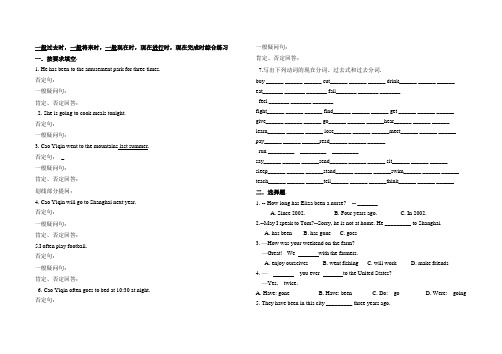
一般过去时,一般将来时,一般现在时,现在进行时,现在完成时综合练习一.按要求填空.1. He has been to the amusement park for three times.否定句:一般疑问句:肯定、否定回答:2. She is going to cook meals tonight.否定句:一般疑问句:3. Cao Yiqin went to the mountains last summer.否定句:_一般疑问句:肯定、否定回答:划线部分提问:4. Cao Yiqin will go to Shanghai next year.否定句:一般疑问句:肯定、否定回答:5.I often play football.否定句:一般疑问句:肯定、否定回答:6. Cao Yiqin often goes to bed at 10:30 at night.否定句:一般疑问句:肯定、否定回答:7.写出下列动词的现在分词、过去式和过去分词.buy ______ ______ ______ cut______ ______ ______ drink______ ______ ______eat_______ _______ _______ fall_______ _______ _______feel _______ _______ _______fight______ ______ ______ find______ ______ ______ get ______ ______ ______ give______ ______ ______ go______ ______ ______hear______ ______ ______learn______ ______ ______ lose______ ______ ______meet______ ______ ______ pay______ ______ ______read______ ______ ______run _________ _________ _________say______ ______ ______send______ ______ ______ sit______ ______ ______sleep______ ______ ______stand______ ______ ______swim______ ______ ______ teach______ ______ ______tell______ ______ ______think______ ______ ______ 二.选择题.1. -- How long has Eliza been a nurse? -- _______A. Since 2002.B. Four years ago.C. In 2002.2.--May I speak to Tom?--Sorry, he is not at home. He _________ to Shanghai.A. has beenB. has goneC. goes3. —How was your weekend on the farm?—Great! We with the farmers.A. enjoy ourselvesB. went fishingC. will workD. make friends4. —you ever to the United States?—Yes, twice.A. Have: goneB. Have: beenC. Do: goD. Were: going5. They have been in this city _________ three years ago.A. forB. aboutC. since6. ―have you been learning English?―I have been learning English for six years.A. How longB. How oftenC. How far7.--Where is Zhang Ming?-- Oh, he _____ to Beijng and he will be back tomorrow.A. has beenB. has goneC. goes8. The Greens____supper now. A:is having B:are;having C:is haveing9.____you usually _____to school with classmates?A. Do, comesB. does, comeC. Do, come10.Mr Green usually______newspapers after supper every day.A. readB. readingC. reads11.______Helen____________(wash )clothes? Yes ,she is .A. Is, washingB. Does , washC. Is, washes12. There ________ a dolphin show in the zoo tomorrow evening.A. wasB. is going to haveC. will haveD. is going to be13. He ________ her a beautiful hat on her next birthday.A. givesB. gaveC. will givingD. is going to giving14. There __________ a meeting tomorrow afternoon.A. will be going toB. will going to beC. is going to beD. will go to be 三.填空题.1.我母亲通常在星期日打扫卫生、洗衣服。
英语16种时态及练习题附答案
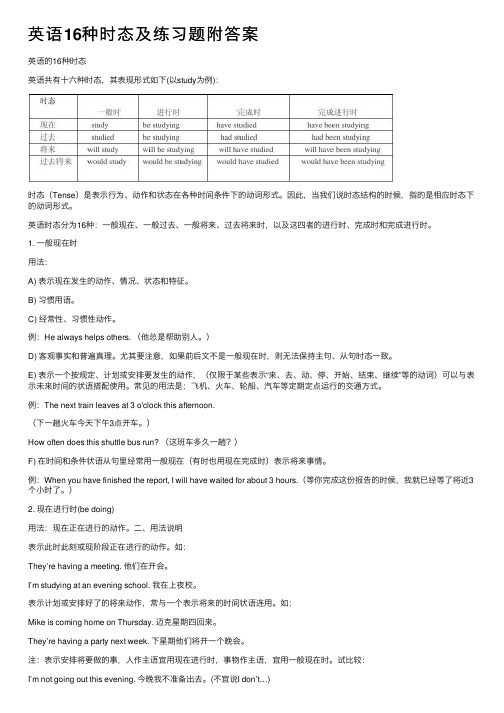
英语16种时态及练习题附答案英语的16种时态英语共有⼗六种时态,其表现形式如下(以study为例):时态(Tense)是表⽰⾏为、动作和状态在各种时间条件下的动词形式。
因此,当我们说时态结构的时候,指的是相应时态下的动词形式。
英语时态分为16种:⼀般现在、⼀般过去、⼀般将来、过去将来时,以及这四者的进⾏时、完成时和完成进⾏时。
1. ⼀般现在时⽤法:A) 表⽰现在发⽣的动作、情况、状态和特征。
B) 习惯⽤语。
C) 经常性、习惯性动作。
例:He always helps others. (他总是帮助别⼈。
)D) 客观事实和普遍真理。
尤其要注意,如果前后⽂不是⼀般现在时,则⽆法保持主句、从句时态⼀致。
E) 表⽰⼀个按规定、计划或安排要发⽣的动作,(仅限于某些表⽰“来、去、动、停、开始、结束、继续”等的动词)可以与表⽰未来时间的状语搭配使⽤。
常见的⽤法是:飞机、⽕车、轮船、汽车等定期定点运⾏的交通⽅式。
例:The next train leaves at 3 o'clock this afternoon.(下⼀趟⽕车今天下午3点开车。
)How often does this shuttle bus run? (这班车多久⼀趟?)F) 在时间和条件状语从句⾥经常⽤⼀般现在(有时也⽤现在完成时)表⽰将来事情。
例:When you have finished the report, I will have waited for about 3 hours.(等你完成这份报告的时候,我就已经等了将近3个⼩时了。
)2. 现在进⾏时(be doing)⽤法:现在正在进⾏的动作。
⼆、⽤法说明表⽰此时此刻或现阶段正在进⾏的动作。
如:They’re having a meeting. 他们在开会。
I’m studying at an evening school. 我在上夜校。
表⽰计划或安排好了的将来动作,常与⼀个表⽰将来的时间状语连⽤。
(完整版)一般将来时、一般现在时、一般过去时、正在进行时练习题
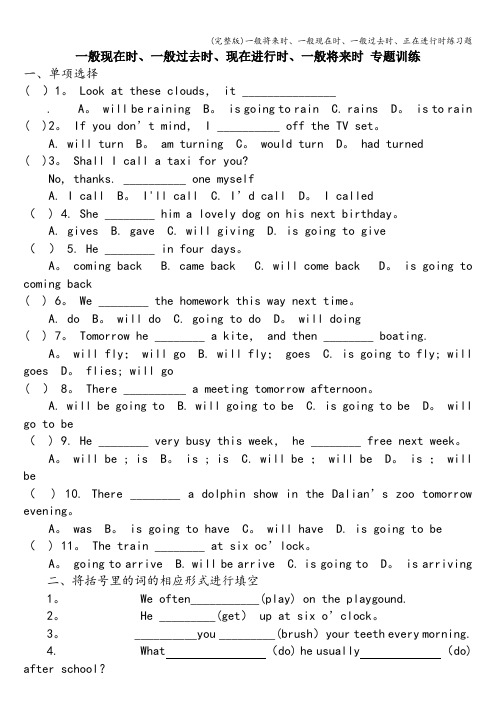
一般现在时、一般过去时、现在进行时、一般将来时专题训练一、单项选择( )1。
Look at these clouds, it _______________. A。
will be raining B。
is going to rain C. rains D。
is to rain ( )2。
If you don’t mind, I __________ off the TV set。
A. will turn B。
am turning C。
would turn D。
had turned( )3。
Shall I call a taxi for you?No, thanks. __________ one myselfA. I call B。
I'll call C. I’d call D。
I called() 4. She ________ him a lovely dog on his next birthday。
A. givesB. gaveC. will givingD. is going to give() 5. He ________ in four days。
A。
coming back B. came back C. will come back D。
is going to coming back( ) 6。
We ________ the homework this way next time。
A. do B。
will do C. going to do D。
will doing( ) 7。
Tomorrow he ________ a kite, and then ________ boating.A。
will fly; will go B. will fly; goes C. is going to fly; will goes D。
flies; will go( ) 8。
小学英语时态综合练习题
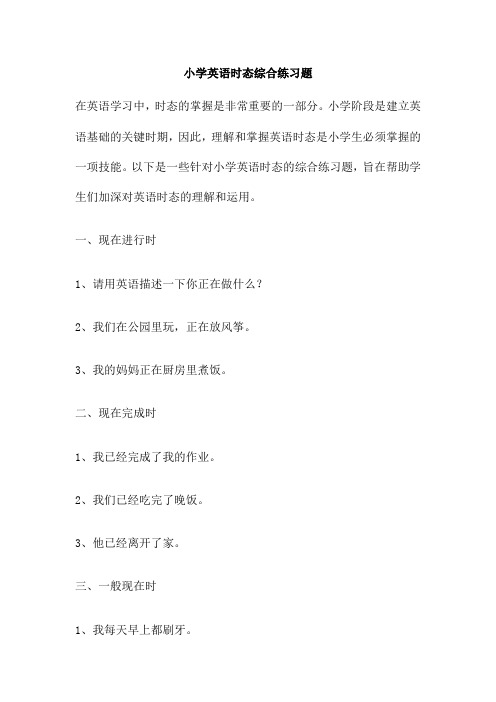
小学英语时态综合练习题在英语学习中,时态的掌握是非常重要的一部分。
小学阶段是建立英语基础的关键时期,因此,理解和掌握英语时态是小学生必须掌握的一项技能。
以下是一些针对小学英语时态的综合练习题,旨在帮助学生们加深对英语时态的理解和运用。
一、现在进行时1、请用英语描述一下你正在做什么?2、我们在公园里玩,正在放风筝。
3、我的妈妈正在厨房里煮饭。
二、现在完成时1、我已经完成了我的作业。
2、我们已经吃完了晚饭。
3、他已经离开了家。
三、一般现在时1、我每天早上都刷牙。
2、我们每周都去公园玩。
3、他每天晚上都读书。
四、一般过去时1、昨天我去了电影院。
2、上周我们去了海滩。
3、昨晚她看了电视。
五、一般将来时1、我明天将要完成作业。
2、我们下周将要去看电影。
3、他将在下个月搬到新家。
以上练习题旨在帮助学生理解和掌握基本的英语时态。
对于小学生来说,时态的学习可能相对复杂,但通过反复练习和实际应用,他们可以逐渐掌握并开始在日常生活中运用这些时态。
教师和家长可以鼓励学生多做类似的练习,帮助他们提高英语时态的理解和运用能力。
小学英语时态练习题一、一般现在时1、I eat apples every day. (我每天吃苹果。
)2、He studies hard every day. (他每天努力学习。
)3、They play basketball every week. (他们每周打篮球。
)二、现在进行时1、I am eating apples now. (我现在正在吃苹果。
)2、He is studying hard now. (他现在正在努力学习。
)3、They are playing basketball now. (他们现在正在打篮球。
)三、一般过去时1、I ate apples yesterday. (我昨天吃了苹果。
)2、He studied hard yesterday. (他昨天努力学习了。
)3、They played basketball yesterday. (他们昨天打篮球了。
一般现在时-现在进行时-一般过去时练习题及答案

一般现在时-现在进行时-一般过去时练习题及答案1. The population of the world ____ still ____ now.A. has; grownB. is; growingC. will; growD. is; grown2. ---Good evening. I _____ to see Miss Mary.---Oh, good evening. I’m sorry, but she is not in.A. have comeB. comeC. cameD. had come3. — It’s time for dinner. Where is your father, Emma? — He _____ his bike in the yard.A. cleanB. cleanedC. is cleaningD. will clean4. If you _____ carefully, you ______ the report well.A. will listen; will be understoodB. will listen; understandC. listen; will understandD. listen; understand5. They ______ about eight hundred English words by the end of last term.A. will learnB. had learnedC. are going to learnD. have learned6. —How did the accident happen?—You know, it ______ difficult to see the road clearly because it.A. was; was rainingB. is; has rainedC. is; is rainingD. will be; will rain7. Attention, please. There _____ a football game between China and Korea this evening.A. is going to beB. has beenC. hasD. will have8. —What does your sister like doing in her spare time?—She _____ watching TV.A. likesB. likedC. has likedD. had liked9.—When ____ Jessy ____ to New York?—Yesterday.A. does; getB. did; getC. has; gotD. had; got10. —How clean the bedroom is!—Yes, I am sure that someone it.A. cleansB. cleanedC. has cleanedD. had cleaned11. My friend ______ me. I have to leave now.A. waits forB. waited forC. is waiting forD. was waiting for12. Be sure to let Tom know the notice as soon as he ______.A. will arriveB. was arrivingC. arrivesD. arrived13. I ______ the wrong thing. Can I use your eraser?A. writeB. wroteC. am writingD. will write14. ---Are you going to help John with his Chinese this evening? ---NO, He ______ to England. He will be back next month.A. returnedB. has returnedC. returnsD. will return15. ---Who’s won the first prize in the competition?---Henry______. He has ______ it for a week.A. is, wonB. is, gotC. has, hadD. has, been given16. ---Is this the place that you ______ ?---No. I’ve never been there before.A. have visitedB. will visitC. are visitingD.would visit17. It ______ outside. You’d better take an umbrella with you.A. rainsB. is rainingC. rainedD. has rained18. ---Can I help you?---I bought this watch here yesterday, but it ______ work.A. won’tB. didn’tC. doesn’tD. wouldn’t19. I used to love this film when I was young, but I ______ it that way any more.A. don’t feelB. didn’t feelC. haven’t feltD. hadn’t felt20. ---How was your trip to the ancient village?---Fantastic! We ___________to a museum of strange stones.A. go B. went C. are going D. will go21. —Where is Peter?—He ______ volleyball with his friends in the school gym.A. playsB. playedC. is playingD.was playing22. ---Hello! Can I speak to Mr. White?---Sorry, he isn’t here right now. He ______ to the theme park.A. will goB. was goingC. has goneD. has been23. ---______ you ______ your drawing?---Not yet! It will be done in a few minutes.A. Did; finishB. Will; finishC. Do; finishD. Have; finished24. She ______ as an animal trainer since 2003.A. has workedB. worksC. will workD. have worked25. They ______ her to the party, so she was very happy.A. inviteB. invitedC. will inviteD. are inviting26. Mr. Green ______ to the manager now. You’d better call him later.A. talkB. talkedC. is talkingD. was talking27. Prison Break is the best American TV play that I ______ these years.A. watchB. will watchC. have watchedD. was watching28. ---Alice, turn down the TV, please. I _________ on the phone.---Oh, sorry.A. have talkedB. talkedC. am talkingD. talk29. --- Where are the Greens, may I ask?--- Well, they ______ to England. They have been there for nearly a week now.A. have beenB. are going toC. have goneD. will go30.The teachers_______ the office for a few minutes when we arrived. We didn’t meet them.A. had been away fromB. had leftC. have been away fromD. have left1-5BBCCB 6-10AAABC 11-15CCBBC 16-20ABCAB21-25CCDAB 26-30CCCCA。
一般将来时、一般现在时、一般过去时、正在进行时练习题
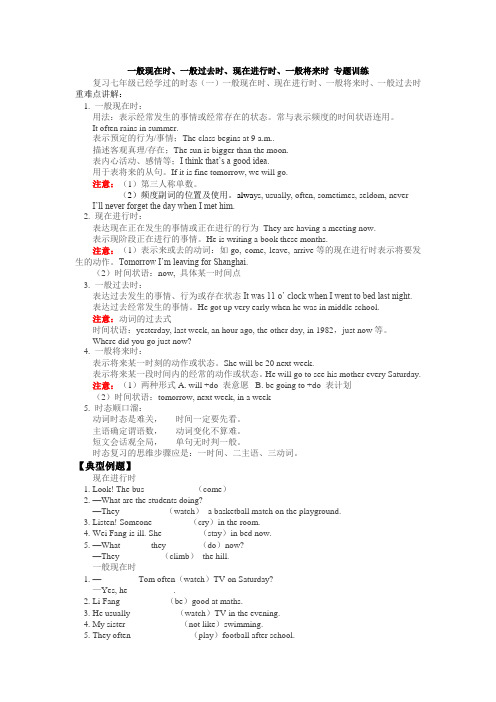
一般现在时、一般过去时、现在进行时、一般将来时专题训练复习七年级已经学过的时态(一)一般现在时、现在进行时、一般将来时、一般过去时重难点讲解:1. 一般现在时:用法:表示经常发生的事情或经常存在的状态。
常与表示频度的时间状语连用。
It often rains in summer.表示预定的行为/事情;The class begins at 9 a.m..描述客观真理/存在;The sun is bigger than the moon.表内心活动、感情等;I think that’s a good idea.用于表将来的从句。
If it is fine tomorrow, we will go.注意:(1)第三人称单数。
(2)频度副词的位置及使用。
alwa ys, usually, often, sometimes, seldom, never I’ll never forget the day when I met him.2. 现在进行时:表达现在正在发生的事情或正在进行的行为They are having a meeting now.表示现阶段正在进行的事情。
He is writing a book these months.注意:(1)表示来或去的动词:如go, come, leave, arrive等的现在进行时表示将要发生的动作。
Tomorrow I’m leaving for Shanghai.(2)时间状语:now, 具体某一时间点3. 一般过去时:表达过去发生的事情、行为或存在状态It was 11 o’ clock when I went to bed last night.表达过去经常发生的事情。
He got up very early when he was in middle school.注意:动词的过去式时间状语:yesterday, last week, an hour ago, the other day, in 1982,just now等。
一般现在时-现在进行时-一般过去时练习题及答案
一般现在时-现在进行时-一般过去时练习题及答案Light _____much faster than sound.A. travelB. travelsC. to travelD. traveling答案:B思路分析:浏览题干可知句意为“光(传播的速度)比声音(传播的速度)要快得多”。
这是一个客观真理,故用一般现在时。
light作主语,且是第三人称单数,故谓语动词也用第三人称单数形式。
The boys _____ students.A. amB. isC. areD. be答案:C思路分析:根据主语the boys是复数可知谓语动词应用复数形式。
be是动词原形,am对应的主语是I,is对应的主语是第三人称单数,故只有are最合适。
句意为“这些男孩是学生”。
He usually _____early and _____ English in the morning.A. gets up; readB. get up; readsC. get up; readD. gets up; reads思路分析:浏览题干,usually意为“通常”,是一般现在时的标志词;主语he是第三人称单数,故谓语动词也用单数形式;and连接两个并列的动作,故两个动词都用单数形式。
符合题意的只有D项。
句意为“他通常早晨早起读英语”。
She often _____ supper with her grandmother.A. haveB. hasC. is haveD. is has答案:B思路分析:浏览题干和各选项可知句意为“她经常和奶奶一起吃晚饭”。
表示“吃”的have是实义动词,故句中不可再用系动词is,排除C,D两项;主语she是第三人称单数,故谓语动词也用第三人称单数形式has。
The story _____interesting and we _____it very much.A. sounds; are likingB. is sounding; likeC. sounds; likeD. sound; likes答案:C思路分析:浏览各选项可知sound, like是表示感觉的词,常用于一般现在时。
小学英语语法时态归纳及练习(含答案解析)
英语时态归纳一、一般现在时:标志词:often(经常) sometimes(有时) always(总是) usually(通常) never(从不) every(每一)行为动词词型变化形式:一般现在时动词只有第三人称有词形变化;其他人称(第一人称:I, we;第二人称:you;第三人称复数:they、my friends)动词均用原形。
当主语是第三人称单数时,一般动词在一般现在时句子中的变化规律:1、多数在动词后加s:play—plays like—likes ,2、以s,x,sh,ch,o结尾的动词加es wash–washes catch–catches do–does3、以辅音字母加y结尾,把y改i再加es fly—flies study—studies4、以元音字母加y结尾,直接加s buy – buys5、不规则变化have—has一般现在时基本用法功能1.表示事物或人物的特征、状态。
如:The sky is blue.天空是蓝色的。
2.表示经常性或习惯性的动作。
如:I get up at six every day.我每天六点起床。
3.表示客观现实。
如:The earth goes around the sun.地球绕着太阳转。
The earth is round.构成1. be动词:主语+be(am,is,are)+其它。
如:I am a boy.我是一个男孩。
2.行为动词:主语+行为动词(+其它)。
如:We study English.我们学习英语。
句型肯定句:A.be动词:主语+ be + 其它成分He is a worker.B.行为动词:主语+动词(注意人称变化) +其它成分We like the little cat.否定句:A.be动词:主语+ be + not+其它成分They are not students.B.行为动词:主语+助动词(do/does) + not+动词原形+其它成分We don’t like the little cat.一般疑问句:A.be动词:Am / Is /Are +主语+ 其它成分Are you a teacher? Yes, I am. / No, I am not.Are they students of your school. Yes, they are / No they aren’t.B.行为动词:助动词(Do/Does)+主语+动词原形+ 其它成分Do you like it? Yes, I do. / No. I don’t .Does he(she) like it? Yes, he( she )does. / No, he ( she )doesn’t.特殊疑问句:疑问词+ 一般疑问句A.be动词:How many students are there in your school?B.行为动词:What do you usually do on Sunday?一般现在时动词be和have的变化形式1.动词Be 叫连系动词, 用法:第一人称单数用am,第三人称单数用is,其它人称用are。
小学四大时态英语练习题
小学四大时态英语练习题在小学阶段,英语的四大基本时态是一般现在时、现在进行时、一般过去时和一般将来时。
以下是一些练习题,帮助学生巩固和练习这些时态。
一般现在时1. 填空题:请用正确的动词形式填空。
- I ___ (go) to school every day.- She ___ (have) lunch at twelve o'clock.2. 选择题:选择正确的答案。
- Where ___ your parents live?- A. do B. does C. is3. 改错题:找出句子中的错误并改正。
- He plays the piano very good.现在进行时1. 填空题:请用正确的现在分词形式填空。
- Look! The children ___ (play) in the park.- She ___ (read) a book now.2. 选择题:选择正确的答案。
- What ___ you ___ now?- A. are, doing B. do, do C. is, doing3. 改错题:找出句子中的错误并改正。
- They are going to the zoo tomorrow.一般过去时1. 填空题:请用正确的过去式动词填空。
- I ___ (visit) my grandparents last weekend. - She ___ (go) to the library yesterday.2. 选择题:选择正确的答案。
- What time ___ he ___ up this morning?- A. did, get B. does, get C. is, getting3. 改错题:找出句子中的错误并改正。
- She was watched a movie last night.一般将来时1. 填空题:请用正确的将来时态动词填空。
- I ___ (go) to the beach next weekend.- They ___ (have) a party on Friday.2. 选择题:选择正确的答案。
一般现在时、一般过去时、现在进行时、现在完成时、过去完成时、过去将来时、一般将来时初中全部时态练习题
时态专项复习(一般现在时、现在进行时、一般过去时)一、用动词的正确形式填空1。
I ________ (do) my homework every evening.2。
We _______ (fly)kites in the park on Sundays.3. My mother _____________ (clean)our room on Sundays。
4。
Tom ____________(play) the piano every Saturday. Now he____________ (play).5。
She ___________(like) swimming。
She _____________ (swim) last weekend.6。
Usually my mother _______________ (wash)the dishes after lunch. But my grandma _____________ (wash) today.7。
Look at the man!He ____________ (read)a magazine.8. Look! The plane ______________ (fly) over the building。
9。
Listen! My aunt ______________ (sing) in the room。
She is a singer. She __________ (like) singing. She _____________(have)a music show。
She is excited。
10. Tom and Mike always ______________ (swim) in the river. They ___________ (swim)in the swimming pool three days ago。
- 1、下载文档前请自行甄别文档内容的完整性,平台不提供额外的编辑、内容补充、找答案等附加服务。
- 2、"仅部分预览"的文档,不可在线预览部分如存在完整性等问题,可反馈申请退款(可完整预览的文档不适用该条件!)。
- 3、如文档侵犯您的权益,请联系客服反馈,我们会尽快为您处理(人工客服工作时间:9:00-18:30)。
For personal use only in study and research; not for commercial use
一般现在时,现在进行时,一般过去时练习题及答案
一、句型转换
1. My English teacher went to the movies with her sister.(改为一般疑问句)
_________ your English teacher ___________ to the movies with her sister?
2.He didn’t have any money for a bike.(改为肯定句) He _________ __________ money for a bike.
3.The man takes the subway to work every day.(改为否定句)The man ______ ______ the subway to work every day.
4. I walk home after school.(改为同义句) I go home _________ _________ after school.
5. It’s time for lunch.(改为同义句) It’s time __________ __________ lunch.
6. Lucy did her homework at home.(改否定句)Lucy ________ _______ her homework at home.
7.He found some meat in the fridge(冰箱).(变一般疑问句) _______ he _______ _______ meat in the fridge?
8. There was some orange in the cup.(变一般疑问句)
二、用括号内所给动词的适当形式填空
1. Jane often ________ (take) the bus to school. 3. Did you enjoy _______ (go) shopping.
2. —What did you do last Sunday?—I ________(study) for the English test.
4. The boy likes English very much, so he ________ (practice) reading English every morning.
5. Look! Liu Ying _________ (do) her homework.
6.He______(play)football very well.
7.Danny________(go)to school at7:10.
8. _____your sister_____(know)English? 9.Her home____ _____ ______(远离)her school.
10.The pot_____(not look) like your pot very much. 11.______she_____(do) the housework every day?
12.Jenny and Danny usually______(play) games in the afternoon .
13. I _________ (have) an exciting party last weekend.
14. _________ she _________(practice) her guitar yesterday? No, she _________.
15. What ________ Tom ________ (do) on Saturday evening?
He ________(watch) TV and __________(read) an interesting book.
16. They all _________(go) to the mountains yesterday morning.
17. She _________(not visit) her aunt last weekend. She ________ (stay) at home and _________(do) some cleaning.
三、选择题
1. He is very tired. He doesn’t want to do _______. A.something B.nothing C.everything
D.anything
2. Everyone ______ here last Monday. A.were B.is C. are D. was
3. It’s time ____class. A.for have B. have C. to have D. to having
4. He helped his mother clean the rooms and then ____ his homework yesterday afternoon.
A. do
B.doing
C. does
D. did
5. Jenny ____ in an office. Her parents ____in a hospital.
A work; works
B works; work
C work; are working
D is working; work
6. One of the boys_____ a black hat. A have B there is C there are D has
7.Wang Mei____music and often____to music.A like;listen B likes;listens C like;are listening D liking listen
8.Jenny____English every evening.A has study B studies C study D studied
9.My father______ill yesterday.A.isn't B.aren't C.wasn't D.weren't
10.____your parents at home last week﹖A.Is B.Was C.Are D.Were
11. your father at work the day yesterday ﹖A.Was;before B.Is;before C.Was;after D.Is;after
12.—Who was on duty last Friday﹖—___.A.I am B.I was C.Yes,I was D.No,I wasn't
答案
一、1.Did, go 2.had, some 3.doesn’t, take 4.on foot 5.to, have 6. didn’t ,do
7. Did,find,any 8. Was there any orange in the cup?
二、1.takes 2.studied 3.going 4. practices 5. is doing 6.plays
7.goes8. Does know 9. is away from 10. doesn't look 11. Does, do 12. Play
13.had 14. Did, practice, didn’t 15. Did,do,watched,read 16.went 17. didn’t,visit, stayed,did
三、1-5 D.D.C.D.B 6-10 D.B.B.C.D 11-12.A.B
For personal use only in study and research; not for commercial use.
Nur für den persönlichen für Studien, Forschung, zu kommerziellen Zwecken verwendet werden. Pour l 'étude et la recherche uniquement à des fins personnelles; pas à des fins commerciales. толькодлялюдей, которыеиспользуютсядляобучения, исследованийинедолжныиспользоватьсявкоммерческихцелях.
以下无正文
For personal use only in study and research; not for commercial use.
Nur für den persönlichen für Studien, Forschung, zu kommerziellen Zwecken verwendet werden. Pour l 'étude et la recherche uniquement à des fins personnelles; pas à des fins commerciales. толькодлялюдей, которыеиспользуютсядляобучения, исследованийинедолжныиспользоватьсявкоммерческихцелях.
以下无正文
THANKS !!!
致力为企业和个人提供合同协议,策划案计划书,学习课件等等
打造全网一站式需求
欢迎您的下载,资料仅供参考。
